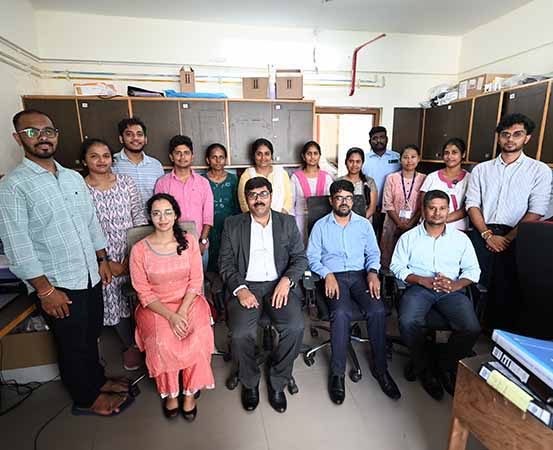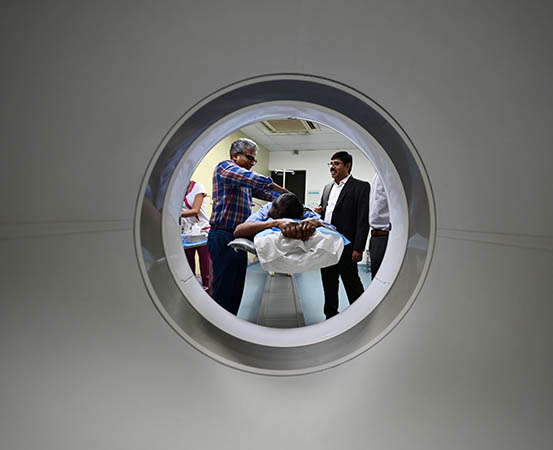
A recent study by researchers at HCG Cancer Hospital, Bangalore has revealed that introducing low-dose immunotherapy with chemotherapy to those in stage 3 and 4 of Head and Neck Cancer (HNC), has shrunk the tumor by almost 90 %. Whereas, the conventional chemotherapy is known to shrink the tumor by not more than 40%.
The study included a cohort of 12 persons aged between 54-76 years suffering from HNC. Speaking about the clinical trial results, Dr BS Ajaikumar, Executive Chairman of Healthcare global enterprises limited, said that the low-dose immunotherapy uses monoclonal antibody drug known as Nivolumab to fight and destroy the cancer cells.
High-dose vs low-dose immunotherapy
The primary goal of low-dose immunotherapy is larger accessibility, says Dr Ajaikumar. “Until now only 20% of the head and neck cancer patients could afford a full dose immunotherapy in India. This study, if successful, can make immunotherapy accessible and affordable to nearly 80% of those with head and neck cancer,” he said. The low-dose immunotherapy treatment cost 1/5th the cost of the full dose immunotherapy treatment and is found to be effective.
Dr Ajaikumar further explains, “A full dose immunotherapy exposes some individuals to the risk of developing immunological response in the form of inflammatory cytokines which can cause resistance to therapy and metastasis in rare cases. In a low-dose immunotherapy, such responses are less likely to develop but have been said to have reduced side-effects. However, this may require further investigation.”
Dr Satheesh adds, a person who weighs 70 kg, will require about 240 mg of the drug for a full dose immunotherapy. However, 40 mg is effective for a low-dose and this should be given in an interval of 21 days.
“The study is a big leap in cancer treatment with India facing the highest burden of HNC cases globally. Most of the affected are aged between 40-60 years,” Dr Ajaikumar said.
“Since chemotherapy alone would shrink the tumor by only 40%, the study tried to adopt low-dose immunotherapy to destroy cancer cells through immunity building drugs,” said Dr CT Sateesh, medical and hemato oncologist, director of clinical trials at HCG who spearheaded the study.
Why low-dose immunotherapy for stage 3-4 head and neck cancer?
This study did not include those in early stages of head and neck cancer, clarifies Dr Sateesh “In stage 1 and 2, the tumor can be treated with surgery, hence low-dose immunotherapy is irrelevant.” Dr Ajaikumar adds “this treatment would also not be suitable for those who are in more advanced stages of metastasis. However, in stage 3 and 4, the tumor would be locally advanced or bigger in size that could complicate surgery and hence there is a need to shrink the tumor.”
Experts also claim that, while early diagnosis is helpful for better cure, most cases of HNC or oral cancer are identified only in stage 3 and 4 due to lack of awareness and misdiagnosis in the form of dental issues, infections, or acidic reflux.
However, prior to this, in early 2023, a similar study was conducted by researchers in Tata Memorial Centre, Mumbai with 151 HNC patients undergoing low-dose immunotherapy. The study concluded that “the treatment with low-dose Nivolumab is an alternative standard of care for those who cannot access full-dose checkpoint inhibitors (the full dose immunotherapy).”

Who are eligible?
While there are many tests for oral cancer, those in stage 3 and 4 must undergo Immunohistochemistry (IHC) antigen test to understand if they are eligible for this combined treatment. Those who show positive test results with PD-L1 and hot tumors are eligible for low-dose immunotherapy, explains Dr Ajaikumar.
- PD-L1: Otherwise known as programmed cell death ligand 1, is a protein that can destroy the cancer cells. Higher levels of PD-L1 in the body could indicate better response to low-dose immunotherapy.
- Hot tumor: These tumor cells, unlike the cold ones, can attack and destroy the cancer cells in the body facilitating better response to low-dose immunotherapy.
Process of low-dose immunotherapy
In a low-dose immunotherapy, the drug Nivolumab is administered 30 minutes before chemotherapy. After a 21-day gap, the next cycle of therapy is administered. The number of cycles vary from one individual to another.
For example, in case of a 58-year-old a homemaker from Bangalore, was diagnosed with stage 4 mouth cancer and part of the clinical trials, six cycles of low-dose immunotherapy with chemotherapy was given until her cancer cells completely destroyed. “She had a significant lump on her left cheek and suffered a debilitating pain. For a regular tobacco chewer that she is, she could not eat or chew and had ulcers in the mouth,” the doctors said.
“In most individuals the tumor reduces drastically in size, as revealed in Positron Emission Tomography and Computed Tomography (PET-CT) scans. In this study, the tumor, in most individuals, reduced by nearly 90%,” explains Dr Satheesh. This is most often followed by surgical removal of the tumor, he adds.
Way forward
Dr Sateesh opines that as a cancer researcher, it is extremely satisfying when individuals like the 58-year-old woman are cured of cancer without surgical intervention. “To think of facilitating a life free from social stigmas such as body dysmorphia is also rewarding,” he adds.
“Most importantly, with one-third of the Indian population affected by oral cancer, this intervention can be an economic boon too,” adds Dr Ajaikumar.
Progressing further, the HCG team will extend this clinical trial to over 100 cancer patients into a multicentric study and into different cities across India. “This pilot study will also be published in a scientific journal shortly,” said the researchers.
Takeaways
A study conducted by a team of oncologists and researchers from HCG Cancer Hospital, Bangalore has observed that the administration of low-dose immunotherapy drug Nivolumab along with chemotherapy has led to tumor shrinking by 90 percent in those with head and neck cancer at stage 3 and 4. The study has given hope for many cancer patients as most cases are diagnosed in the advanced stages, said doctors.















